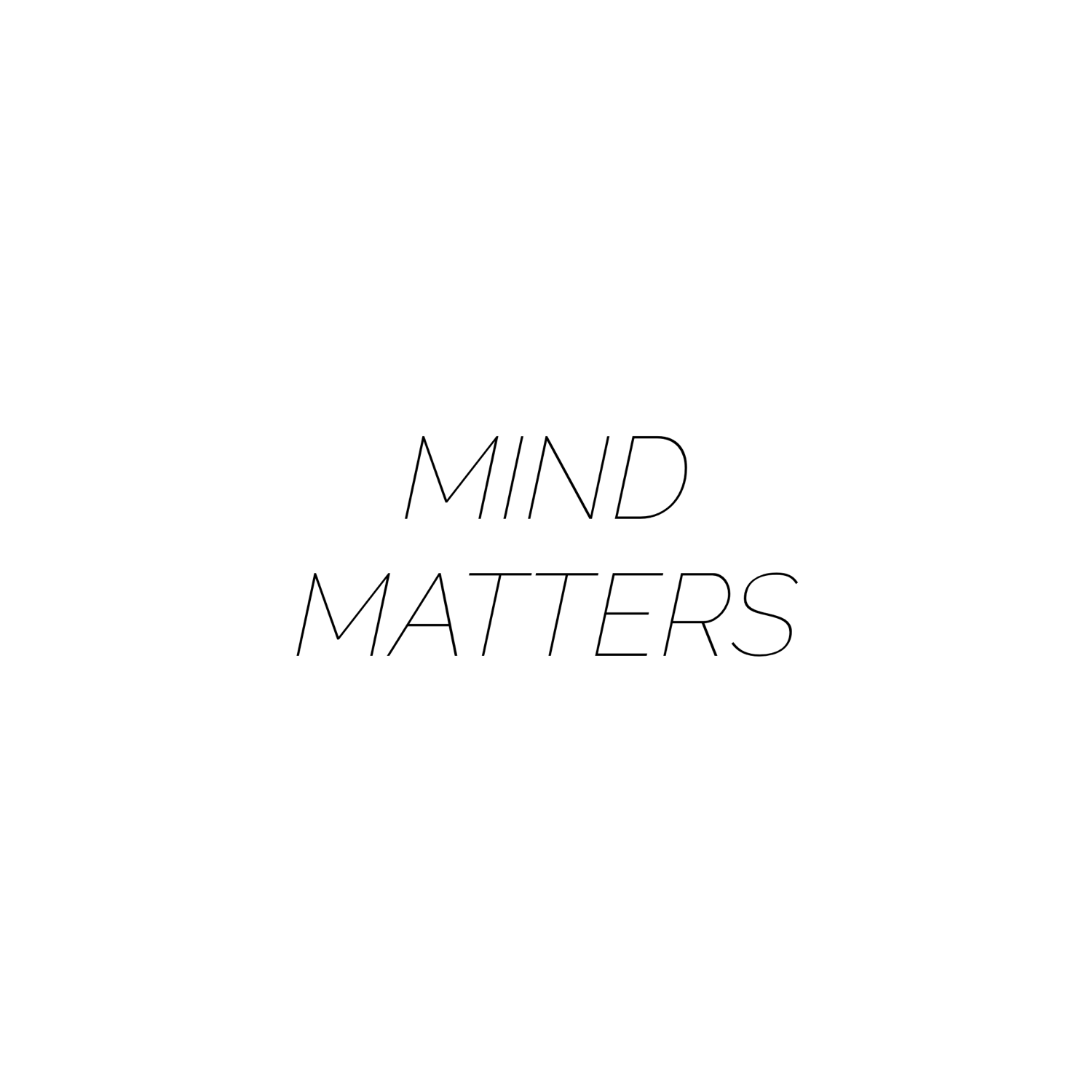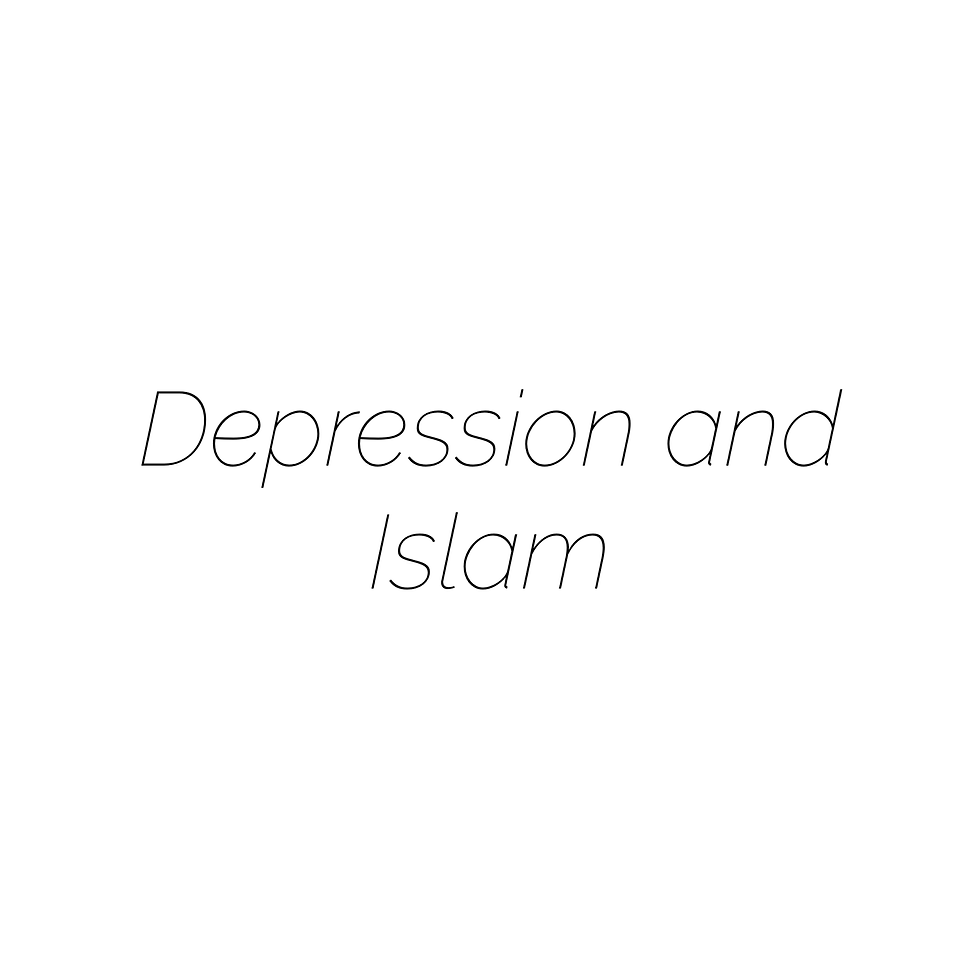Depression and Islam.
- mindmattersblog

- Oct 10, 2020
- 4 min read
Updated: Oct 21, 2020
I rarely tend to talk about my job and personal aspects of my life such as religion and my own mental health together but recently i’ve felt quite conflicted.
This comes after hearing someone say that “depression doesn’t exist or can’t exist within Islam”. To be quite honest, I was dumbfounded by this comment, firstly as a low intensity CBT therapist but also as young muslim who myself has first hand experienced depression and seen others close to me experience symptoms of it. I can confirm, we are definitely not immune to it!
Growing up I was fully aware of the stigma that mental health more so depression had within Islam and the south asian culture. There was a lot of shame attributed to it, and the fear of being labelled or it being seen as a punishment - “only people with weak imaan (faith) are depressed”.
I suppose being in the mental health world, I’ve become so open about mental health and detached from that view. But I recently realised that the above view is still actually widely held and with it being World Mental Health day, I wanted to take this opportunity to address some misconceptions of depression within Islam.
I’m no islamic theologist but from what I do know Islam is a religion that stresses the importance of emotional wellbeing, and the Quran aims to help guide those who are struggling.
I recently read an article on the BPS blog by Frankie Samah, a postgrad student on the topic of the Quran and mental health. I picked up a few points which were really interesting to me:
1) How destructive language and negative life events impact our neurological processes i.e. if the language we hear is destructive we are more likely to ruminate and have negative thought patterns which then in turn leads to the release of hormones/neurotransmitters which interrupt brain functioning such as logic but also damage key structures that regulate our emotions.
2) The psychological language within the Quran. Similar to Freuds Psychoanalytic theory of the id, ego and superego - the Quran mentions three states of the inner self which are known as nafs (lexically referring to our psyche, soul, heart or mind as well as desires). So we have the nafs al-ammara (commanding self); nafs al-lawwama – accusatory self; and nafs al-mutmainna (peaceful self). Essentially the nafs al-ammara acts as the id controlling our feelings, thoughts and behaviour when our emotional needs are not met. The nafs al-lawwama is our conscience which allows us to recognise when things are wrong and in turn challenge negative thinking to reach nafs al-mutmainna which implies contentment or peace, the ideal state of ego.
The article made the point that the Quran recognises that mental health problems are in fact very real illnesses and emphasises mindfulness as well challenging our negative thoughts or maladaptive thinking styles. It pointed out the similarities of this process to the main principles of CBT which is to ‘explore the link between thoughts, emotions and behaviour, which aims to alleviate distress by encouraging people to develop more adaptive cognitions and behaviours.’
I very much emphasise and echo the points from this article. Depression isn’t as black and white as many think, there can be so many things that lead us to that state of mind and we can’t deny the neurological aspects of it also.
I am a firm believer in the concept of tawakkul, putting trust in Allah (swt) to take care of all our affairs. Knowing that Allah (swt) has got you no matter what and trusting his plan for you is central to our belief system. But one should not automatically assume that just because someone is depressed they are not thankful to or do not trust Allah (swt). Again our emotions aren’t always as clear cut as you may think. Islam to me recognises that we are all going to struggle and through such concepts helps us to challenge ourselves to get to a point where we can fully put our trust in Allah (swt). So it’s not a case of depression can not exist more so a case of it does and we have to challlenge these emotions. Tawakkul furthermore does not mean giving up efforts from our end and leaving it to God.
“Tie your camel first, and then put your trust in Allah.” (Prophet Muhammad, peace be upon him - Tirmidhi)
When someone breaks their leg, you don't tell them to just read Quran without seeing a doctor, right? Likewise when someone is experiencing depression we shouldn’t just tell them to ‘pray it away’ instead acknowledge their difficulties; encourage them to talk and provide a safe space for them to do so in order to challenge their thoughts and feelings.
Holding such negative perceptions of depression within Islam can be even more damaging for people leading to guilt and further self-stigmatisation. In most cases this narrative puts people off from seeking professional support.
Depression as with other mental health problems are very much real, they are not a choice.
As one of my favourite scholars Mohammed Hoblos has stated, there is no denying the role of spirituality and strengthening our relationship with Allah (swt) in healing however seeking support is equally as important (remember tie your camel first) there is also no shame in accessing support.
“There is no disease that Allah has sent down except that He has also sent down it’s treatment” (Sahih Buhkari)
We are encouraged to acknowledge that we are human and we do experience negative thoughts or feelings; for this life is a test, right? And the Prophet Muhammad (pbuh) stated we should seek the cure of our illnesses too. As a LICBT therapist, I can’t encourage this enough!
I hope going forward we can recognise the importance of our psychological wellbeing and remove the stigma related to mental health within our communities.


Comments